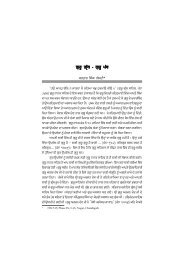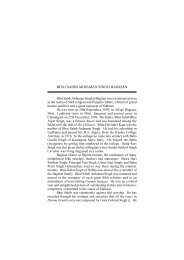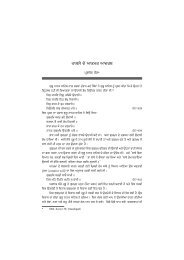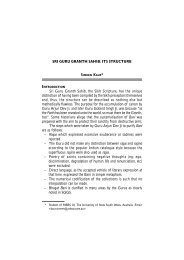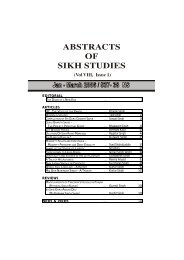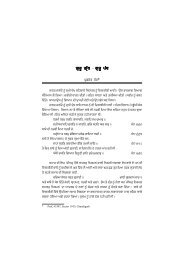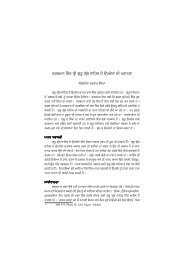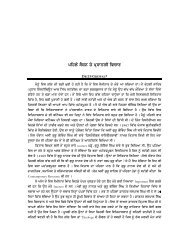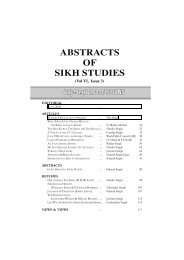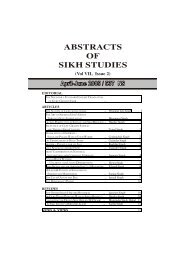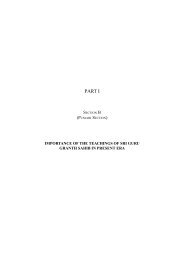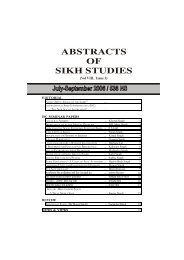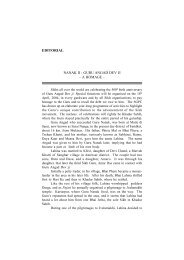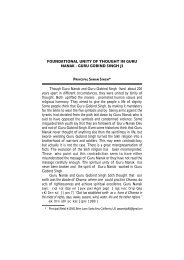Kalaam-e-Goya : Bhai Nand Lal - Institute of Sikh Studies
Kalaam-e-Goya : Bhai Nand Lal - Institute of Sikh Studies
Kalaam-e-Goya : Bhai Nand Lal - Institute of Sikh Studies
Create successful ePaper yourself
Turn your PDF publications into a flip-book with our unique Google optimized e-Paper software.
COMMENTS<br />
<strong>Kalaam</strong>-e-<strong>Goya</strong>, the poetry <strong>of</strong> <strong>Bhai</strong> <strong>Nand</strong> <strong>Lal</strong> <strong>Goya</strong> translated<br />
by S. Pritpal Singh Bindra, winner <strong>of</strong> Akali Phoola Singh Book Award<br />
‘98 is an attempt to help the <strong>Sikh</strong> Jagat to enjoy the outpourings <strong>of</strong> the<br />
mystic mind <strong>of</strong> <strong>Bhai</strong> <strong>Nand</strong> <strong>Lal</strong> who chose to spend the Autumn <strong>of</strong> his<br />
life in Anandpur Sahib living in close proximity <strong>of</strong> Guru Gobind Singh Ji.<br />
Sixty-one Ghazals Nineteen Rubayaats and a few Baits bring<br />
the readers to perceive the transcendental mind <strong>of</strong> <strong>Bhai</strong> Sahib, which<br />
has no boundaries. The metaphoric universe <strong>of</strong> Ghazals through deautomatised<br />
psyche produces wise passiveness, mental silence and<br />
choiceless attention in readers who get wonderstruck at the beatitude<br />
<strong>of</strong> <strong>Goya</strong>’s expression.<br />
<strong>Bhai</strong> <strong>Nand</strong> <strong>Lal</strong> takes us to the oceanic stage <strong>of</strong> relating,<br />
responding and becoming through his Rubaiyaat and urges us to cultivate<br />
our own gardens <strong>of</strong> love. The language <strong>of</strong> <strong>Bhai</strong> <strong>Nand</strong> <strong>Lal</strong>’s poetry is<br />
fathomlessly strange, enigmatic and takes us to “the other kind <strong>of</strong> seeing”.<br />
It helps us to dissolve our ego through I’m.<br />
Dr. S. S. Sodhi, Ph.D.<br />
Halifax, Canada<br />
BHAI NAND LAL GOYA<br />
(1633 – 1713)<br />
Outside Guru Granth Sahib, the holy <strong>Sikh</strong> scripture (consecrated<br />
1604AD), and next to the Epics and Quatrains <strong>of</strong> <strong>Bhai</strong> Gurdas (1551-<br />
1637AD), the <strong>Kalaam</strong>-e-<strong>Goya</strong>, the poetry <strong>of</strong> <strong>Bhai</strong> <strong>Nand</strong> <strong>Lal</strong> <strong>Goya</strong> (1633-<br />
1713AD) is considered to be the most ardent by the celebrated literary<br />
enthusiasts and the lay-zealots. He was a contemporary and the poet laureate<br />
<strong>of</strong> Guru Gobind Singh (1666-1708AD).<br />
His father, Diwan Chhaju Ram, was in the employ <strong>of</strong> the court <strong>of</strong><br />
Prince Dara Shikoh, the eldest son <strong>of</strong> Emperor Shah Jahan, at the regional<br />
capital <strong>of</strong> Multan. When Dara Shikoh moved to Ghazni in Afghanistan,<br />
Diwan Chhaju Ram accompanied him and was appointed the chief secretary<br />
<strong>of</strong> the royal court. <strong>Bhai</strong> <strong>Nand</strong> <strong>Lal</strong> was born there in 1633AD when his<br />
father was just above the age <strong>of</strong> fifty.<br />
The boy <strong>Nand</strong> <strong>Lal</strong> was very brilliant and, apart from good<br />
knowledge <strong>of</strong> Persian and Arabic languages, he gained an insight into<br />
the temporal and the spiritual values <strong>of</strong> life. It is said that, when a religious<br />
priest wanted to put a wooden necklace around his neck to initiate him<br />
into the Vaishnav denomination, he refused to acquiesce. He wanted to<br />
gain full religious knowledge before he would consent to the ritual. His<br />
age at the time was seventeen (<strong>Bhai</strong> Kahan Singh Nabha specifies it as<br />
12).<br />
He was still under twenty when his father died. According to<br />
the custom prevalent, he was <strong>of</strong>fered a job in the royal court, which<br />
was much lower in rank. He wanted to take over his father’s position.<br />
He was dismayed and, after selling all his property there, and collecting<br />
all the money, he moved back to Multan (now in Pakistan), at his parental<br />
abode.<br />
Wasif Khan, the Mughal Chief at Multan had been a friend <strong>of</strong><br />
his father. He <strong>of</strong>fered him the job <strong>of</strong> a secretary. Through his hard work<br />
and intellectual capability, he soon took over the administration as the<br />
principal secretary. Some accounts contend that he rose to the position



